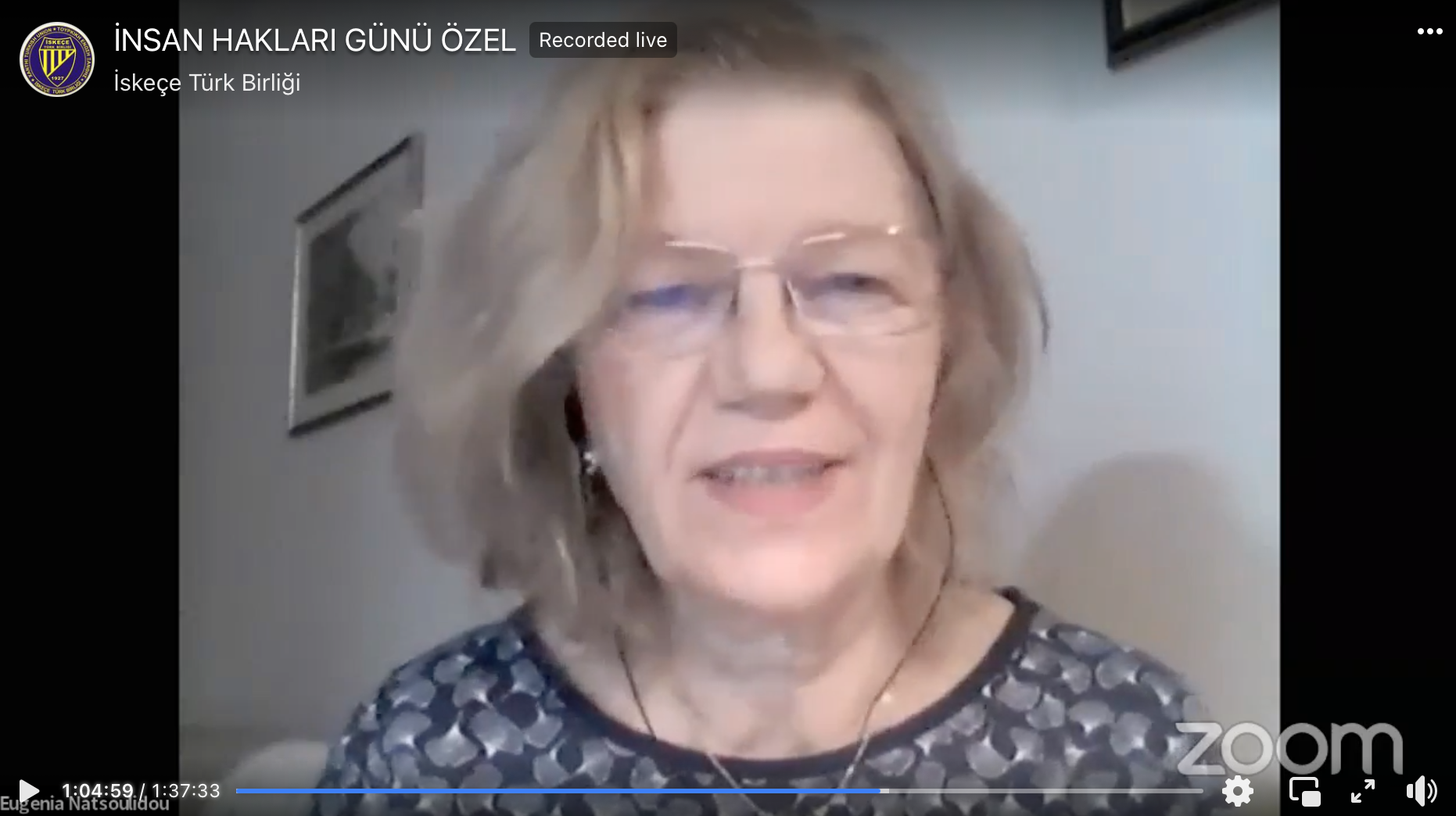Speech delivered by Eugenia Natsoulidou at a Turkish Union of Xanthi event on the occasion of Human Rights Day on December 10, 2021.
Click here for the video in Greek (Eugenia’s remarks begin at 1:04:45)
English translation below:
The obvious reasons for the refusal of the Greek Justice to implement the decisions of the ECHR in favor of minorities.
The case of the “House of Macedonian Culture” and its long legal struggle, in Greek and European courts, is known to most Macedonians, but also to many of our fellow citizens. The case was finalized on October 9, 2015, at the European Court of Human Rights, because Greece did not request a review of the final verdict on July 9 of the same year.
The statute of the association “House of Macedonian Culture”, in article 2, stipulates that the purpose of the association is, inter alia, “cultural decentralization and protection of spiritual and artistic events and the traditions of cultural monuments and in general, the preservation and dissemination of Macedonian culture, the preservation and cultivation of the Macedonian language – MAKEDONSKI – and, as a means to achieve the above goal, states that they are speeches, publications, representation in all its forms, as well as the cooperation of the Association with other associations, which have common aims, with the local government and other competent public or private bodies “.
In the verdict of the ECHR, there is an important statement that shows the desperate attempt of Greece to justify the unjustifiable! Greece, in order to justify the refusal of the Greek courts to grant the legal license to the Macedonian association, submitted the following thoughts as an apology: “However, in this case, the national courts rightly held that the use of the term “Macedonian” in the name of the applicant association as a cultural and linguistic element, different from Greek history, could impede the exercise of freedom to associate to third parties. Such is the case of members of other associations, where the term “Macedonian” is used in its geographical meaning, referring to the northern part of Greece. Furthermore, the Government supports the decisions of the national courts, in particular the courts of the first instance and the courts of appeal, in order to prove that they consider on a case-by-case basis each application for registration of the association. It refers, in particular, to the case of the non-profit organization “Educational and Cultural Movement of Edessa” and the political party “Rainbow,” which have similar aims to those of the applicant association and have been recognized by national courts.” What Greece declares in its apology to the judges of the ECHR, is a blatant confirmation of the policy of discrimination against the Macedonians! We can have the unions registered in Greece, but only if they do not use the term “Macedonian” anywhere in the statute, let alone in their title !!! That is, Greece deprives a portion of Macedonians of the right to use the term “Macedonians / Macedonian”, despite the fact that they are indigenous Macedonians.
Of course, Greece did not explain to the ECHR that a non-profit private organization, such as the “Educational and Cultural Movement of Edessa”, did not need a court decision to operate legally. Nor did it explain to the Court that the “Rainbow” party was registered in 1994, a few days before the European Union elections, due to pressure from EU organizations and European political parties!
Our civil non-profit organization “Macedonian Movement for the Promotion of Mother Tongue – Krste Misirkov” did not need court approval, nor can it be annulled by a court decision. And as NPO we have the right to name our organization as we wish. However, the Macedonian association “Brotherhood of Indigenous-locals of Serres, Cyril and Methodius” was annulled by a court decision on September 13, 2019, although its title does not mention the word Macedonians or Macedonian. The reason for the cancellation this time is the term “locals”! (I read an excerpt from the court decision) “Deliberately falsifies the history and human geography of the region in an attempt to draw a historical argument for the positions of its members, directly aiming at the creation and expansion of a distinct linguistic and cultural community in the border region of Serres, through, for the first time, the systematic recording and long-term cultivation in the population of Serres, which, in fact, speaks the Greek language and has purely a Greek national consciousness”.
That is, we can not be officially Macedonians, but neither can we be locals. “Despite the fact that Greece accepted in the Prespa Agreement that there is a Macedonian nationality and, above all, a Macedonian language, the proof that the policy of denial and discrimination against Macedonians in Greece continues, came to us recently by the revocation of our NPO “Krste Misirkov“ registration in the Register of Cultural Institutions of the Ministry of Culture, just 3 days after its official registration. That is, as soon as they realized, in the Ministry, that it was about a Macedonian association, which uses this term not simply in its geographical meaning.
I am convinced that there is no term that we Macedonians could use to establish an association and be accepted by the Greek authorities. The reason is clear. Any association that promotes diversity in its statutes – linguistic, cultural, ethnic – would represent a minority that could formally claim rights guaranteed by international and European treaties. For Greece, this is an insurmountable taboo.
The reasons are many. It is education, the nationalist policy that prevails in almost all Greek political parties, the Greek anachronistic orthodox church that is tied to the Greek state and influences it in many ways against any progressive change. There are many reasons why in Greece the term minority creates fear and anxiety, first to those in power and consequently to the Greek people. On the contrary, when it comes to Greek minorities living in other countries, the state authorities are willing to inform, very effectively, the people about the rights of these minorities, as provided by international law.
This situation, unfortunately, does not change even with the decisions of the ECHR condemning Greece. Nothing will change for the better when international courts cannot impose sanctions and penalties on any state that violates human rights, especially of minorities, and is convicted by them.
A few days ago I attended the General Assembly of the Network to Promote Language Diversity (NPLD) of which we are a member, and there I heard the statement from a senior European Commission official that the European Council, composed of the Union’s member states and makes the final decisions in the EU, it is not going to take any decision on the protection of minorities if not all the states agree! In addition, I learned that very recently the Supreme Court in Spain ruled that public schools in Catalonia, which teach in the Catalan language, violate the Constitution. In other words, some rights have now been taken away from minorities in the EU Member States! In other words, there is no hope for us in Greece, from the EU. Neither from the Council of Europe, of course, since Greece has not ratified the FRAMEWORK CONVENTION FOR THE PROTECTION OF NATIONAL MINORITIES, that has already been signed, but there is no mechanism that could force it to do so. Unfortunately, this gap in the implementation of minority treaties in Europe remains insurmountable. What remains to be done for minorities and their rights? In my opinion, the burden should fall on the information. The local and international communities must be informed, at every level, about the situation of minorities in Greece. With all the means that technology offers us. In every place where we can find people willing to listen to us and, in turn, pass on to their fellow citizens, organizations, media, etc. what they learn about us. This must be done en masse, as a team, not scattered and isolated, each minority separately. The problem is the same and must be treated in the same way for all minorities – ethnic, linguistic, cultural, and religious. The Greek propaganda that has spread everywhere, in political bodies, in universities, in organizations, etc. abroad, that in Greece there are no minorities except the Muslim one, and only in Western Thrace, must be broken! No mention is made by Greece of our fellow Muslim Turks in the Dodecanese, who are not covered by the Treaty of Lausanne but are clearly a religious minority, as well as a national one.
What is certain is that we should not be disappointed, nor should we give up on our demands. There are many people who have goodwill to help us in this, in the EU but also in many other countries. As long as they know us and listen to us.
Thank you for your attention!

